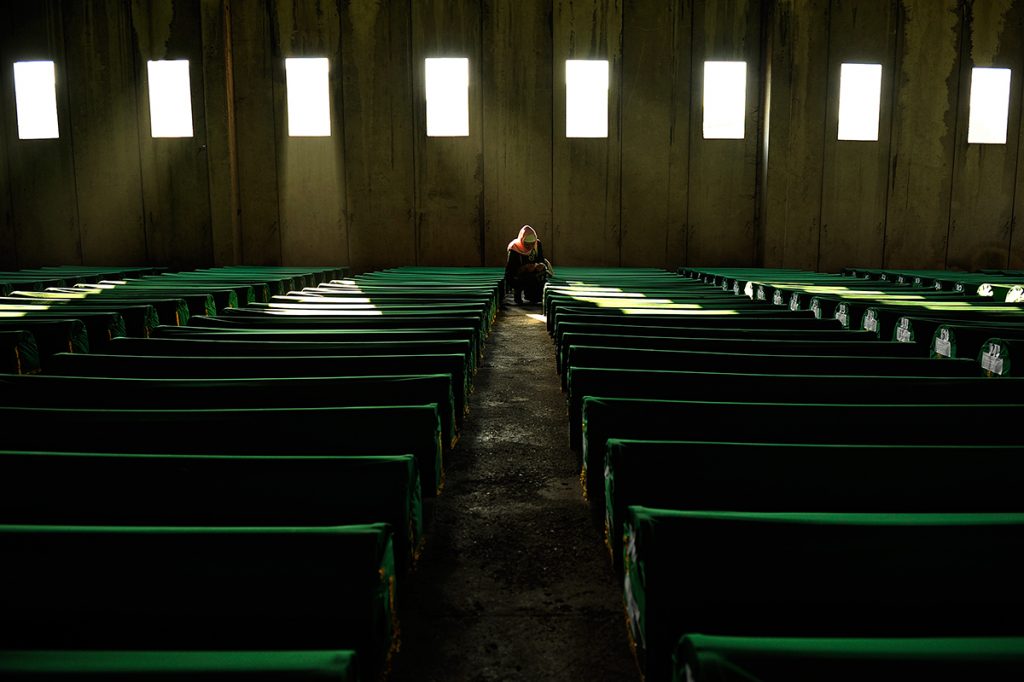
For Bosnia and Herzegovina’s politicians, the vocabulary of commemorations, victims, the past, and crimes should be replaced by words such as activity (i.e., work) and accountability.
It was in 2008, and therefore not so long ago, when the President of the Democratic Action Party (SDA) Sulejman Tihić, while attending the party’s Central Board meeting, said, “We must ultimately overcome the passive position of victimhood and take on the active position and responsibility of a relevant political factor. The past, crimes, casualties and self-pity should not be the central topics of our politics.”
A brave statement — and optimists would even say, a truthful one. However, it had already fallen into oblivion prior to the 2010 general elections, so Tihić and his political disciples started appearing at collective burials and commemorations and cramming themselves into the front rows. Even though such a practice is detrimental to public discourse, it was not abandoned, and the pre-election discourse of Bosnian politicians remained poor and reduced to only a few ear-soothing, unobliging and regularly abused terms.
First and foremost, the terms were used without the supervision of the Election Law of Bosnia-Herzegovina. Thanks to this, the so-called pro-Bosnian parties disregarded the target dates envisaged by this law which marked October 12, 2014, as the start date for their general elections campaigns, and traditionally their pre-election training ground is found in the smaller entity, Republika Srpska.
Term 1: The State
Since political memory has an extremely short life expectancy, it is questionable whether the then Chairman of the Bosnia-Herzegovina Parliamentary House of Representatives, Denis Bećirević of the Social Democratic Party (SDP), even remembers his own initiative from early 2014, when he explicitly demanded that the international community ban the celebration of January 9th as the Day of Republika Srpska (RS).
Bećirović then experienced something that every Bosniak politician regards as a great honor—the Serb Democratic Party (SDS) lashed out at him. This was an excellent opportunity to collect a few pre-election points and to insert a number of pathetic statements into the public discourse such as: “I am prepared not to be elected to any position, but I am not prepared to remain silent when it comes to breaking up Bosnia;” or “I was not elected into Parliament by the SDS, but by the people who love and respect the state of Bosnia.”
This event kicked off Bećirović’s election campaign. As things currently stand, he will be assigned the role of the SDP’s electoral loser for the Bosniak member of the Bosnian presidency. His activities to that end are more than interesting since they show that the position of the “first Bosniak seat” in this country is not possible to obtain without adjusting to the dominant discourse of nationalist parties, which the SDP purports not to be a part of. A proven statesperson must, therefore, bring up Republika Srpska. Thus, after bickering with the SDS, Bećirević went on to launch his (doomed) initiatives to establish a Bosnian Supreme Court and a State Ministry of Agriculture. He also had an unusually strong reaction to Zagreb’s rhetoric about a third entity and an RS Law on Residence coupled with the decision verifying the accuracy and authenticity of data when registering a permanent residence in RS territory. Until now, this discourse has been absent from the rhetoric of this politician.
Term 2: The Defense
Bećirević looked at the current situation of the state, whereas his colleagues remained focused on the past. This was the path taken by the Party for BiH, whose delegation — composed of the Party President Amer Jerlagić, member of the Party Presidency Sejfudin Hodžić, and Podrinje Regional Council President Adib Đozić—showed up on April 8th in Zvornik at the 22nd anniversary celebration of the Day of Resistance.
A commemoration of this sort has never been popular among partisan circles — usually the occasion gathers only a handful of Zvornik locals in the absence of any political figures. It remains unclear what legitimacy a person such as Đozić — one the inventors of political vulturism — has when speaking of “resistance,” since this Tuzla University sociology professor fled his native Srebrenica way before the RS Army siege on the enclave tightened.
Đozić is an interesting persona — once representing the SDA, only to find refuge in the Party for BiH after a corruption scandal related to funds for returnees in the RS. He is well-known for promoting the works of quasi-scientific circles and scholars that present “proof” of a thousand-year old Bosniak claim to Srebrenica — an activity that has granted him easy access to funds. Last year, during the presentation of one such work, Đozić boasted that it would never have seen the light of day had it not been for (another Srebrenica native) Sadik Ahmetović and the reserve funds of the Ministry of Security, which Ahmetović managed at the time.
Exactly how Jerlagić came to remember this living legend of political exploitation of genocide remains unclear. It is true, however, that soon after paying a visit to Zvornik, Đozić found his way to the front row of the Party for BiH’s 18th anniversary commemoration. Today, he has already secured the third spot (first for his party) in the multi-party First of March Coalition list for the RS National Assembly Electoral Unit 5.
Term 3: The Victim
A party of Đozić’s disciples will fight for the remaining spots on the list, namely members of the SDA whose leaders are also warming up before the start of the official campaign. Just as in previous years, they excel within the natural habitat of the springtime mass funerals in the Drina Valley. However, this time they are heading on a march to Drina exactly a week before the first funeral is to be held in Vlasenica—marking the 21st anniversary of crimes committed on a Srebrenica elementary school on April 12, 1993 (the shelling of an elementary school soccer field by the Bosnian Serb Army resulted in deaths of over 60 children).
At last year’s 20th anniversary, there were no other people present except a handful of Srebrenica locals, Mayor Ćamil Duraković, Municipal Assembly Vice-president Hamdija Fejzić and SDA Municipal Board President Sadik Ahmetović. This year, the place was packed! All the Drina Valley SDA leaders were in attendance and, thus, Sadik Ahmetović was joined by the RS People’s Council delegate Šefket Hafizović and RS National Assembly Vice-president Ramiz Salkić. They were, in turn, flanked by the Federation BiH President Živko Budimir.
Even the history lessons, i.e. the stories of those who survived, were pushed to the side by the stories of surviving party members. This was characterized by the attitude of Amir Kulaglić, one of the founders of the Democratic Front in Srebrenica and former Organizational Board President of this commemoration, who had thus far shunned the media until that day. Of course, the people who spoke at last year’s event are forgotten about — Mediha Smajić who lost her father on that soccer field, Fikret Ibrahimović, the father of a girl who was killed, and survivor Hasan Hasanović.
The inclination to adjust to the requirements of the campaign was also exemplified by Hakija Meholjić (SDP) who said the al-fatiha, although anyone who knows him knows he is an atheist of conviction. This was but a continuation of the pre-electoral “religious revolution” within the ranks of the SDP. Meholjić gave a similar performance on March 31st in Potočari at the 11th anniversary of the first collective funeral for genocide victims, where he showed up with Denis Bećirović and the Federal Minister of War Veterans’ and Disabled Soldiers’ Affairs, Zukan Helez. It is worth noting that neither Bećirević nor any other party leader remembered the 10th anniversary.
Term 4: The Mother
During the war, Hava Tatarević lost her six sons and, presumably, there is not a single child in Bosnia and Herzegovina today who has not heard of her tragedy.
Her name may be known to all; however, since the outskirts of Prijedor are a relative terra incognita to media residing in Sarajevo, journalists were not so successful in ascertaining the exact name of her village. Thus, on the popular Klix.ba media portal—one of the first to have published the information about the identification of Hava’s sons—Zecovi became “Zenovo”, only to later become “Zecoe” in the text.
No one ever bothered to proofread the obvious spelling mistakes found in the text written by the portal’s editor-in-chief Faruk Vele, and “Zenovo” thus appeared in a number of other media publications, as well as on the fan page of Chairman of the SDA Caucus Asim Sarajlić where, in a pathetic proclamation, we read: “The terrible and heart-breaking story of Hava, a mother from Zenovo near Prijedor. It is because of cases like this, that we shall not allow the RS to regulate the issue of registration of residence in an unconstitutional and anti-Dayton manner. It is precisely because of such cases that we shall condemn every violation against the rights of returnees, which are jeopardizing their safety and certain political parties in the RS are encouraging extremist individuals to commit serious crimes against the lives and property of returnees, as was recently the case in Kozluk.”
“It is because of this” that politicians could benefit from the occasional visit to the smaller entity. Such a visit may have helped them to learn the actual name of Hava’s village, but such expectations are far fetched, since they are predominantly in the business of recycling stories, which are selected for the occasion by Amor Mašović who is double-hatting as one of directors of the Bosnia-Herzegovina Institute for Missing Persons and as SDA’s representative in the Sarajevo Canton Assembly.
It was Mašović who, at the Sarajevo panel discussion entitled Tomašica – a Death Mine, made Tatarević into a “star”, neglecting in the process all the other people who were found in this mass grave. He said: “Horrific crimes were committed in Prijedor; entire families were murdered. Tatarević, a mother whose six sons were killed, comes from that area… Members of the RS Army and police force transferred the murdered Prijedorians—mostly Bosniaks—to secondary and tertiary mass graves, or even disposed of their bodies using explosives, as was the case with the Jakarina Kosa mass grave.”
Mašović spoke and the politicians took note. Ever since then, they have referred to “mother Hava” countless times.
Hence, they have managed to prove that yet another dodgy term, which has so far been used to describe a different kind of mainly non-political activity, was not so foreign to them: war profiteering. For had there been no war, they would not be where they are today. And, if there were no “state”; no “victims”; and no “mothers”, there would be a lack of investments, unemployment and poverty — the true burning issues, which no one in Bosnia knows how to solve, or better yet, do not wish to solve.






